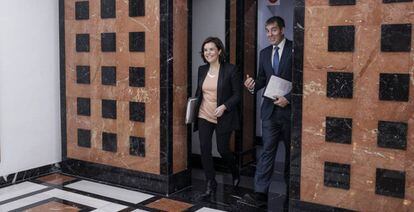Madrid rejects Scottish model for Catalan independence referendum
Deputy PM Soraya Sáenz Santamaría dismisses comparisons, citing sanctity of Spanish Constitution
Spanish Prime Minister Mariano Rajoy will continue to reject any offer of talks with the government of Catalonia about an independence referendum for the northeastern region, calling it a “demand” that would breach a principle of the Spanish Constitution, which states national sovereignty must be decided by all Spaniards.

The Popular Party (PP) government’s position was reiterated on Monday by Deputy Prime Minister Soraya Sáenz de Santamaría, who highlighted this Constitutional premise as the major difference with the proposals being put forward by the Scottish executive for a second independence referendum there, and which Carles Puigdemont and Oriol Junqueras – the premier and deputy premier of the regional government of Catalonia, respectively – have argued can be applied to Catalonia.
Sáenz de Santamaría was responding to an article published in EL PAÍS on Sunday by Puigdemont and Junqueras. Speaking during a visit to the Canary Islands, Santamaría dismissed the initiative: “Dialogue is not what is being offered or asked for; a referendum is being demanded that goes against the Spanish Constitution, and that would deny Spaniards as a whole their capacity to express an opinion about what they want the whole of the Spanish nation to be. It is a demand by those who have a poor understanding of dialogue in their country.”
In Spain we have a Constitution with no possibility of a referendum on self-rule Deputy PM Soraya Sáenz de Santamaría
Santamaría highlighted what she sees as the key differences between Scotland and the United Kingdom and Catalonia and Spain: “The difference is that in Spain we have a Constitution in which, expressly, because that is what the electorate voted for, there is no possibility of a referendum on self-rule. At the time, some people tried to include an amendment to the Spanish Constitution so that referendums on self-rule could take place in Spain, and they failed, because no country can be subjected to the constant threat of referendums of that nature.”
Government sources said that Puigdemont and Junqueras’s arguments contained nothing new, and simply made an eventual meeting with Rajoy more difficult and that by insisting on the obligation to hold a referendum simply created obstacles to proceeding in many other areas. The government is not prepared to admit that its efforts to establish a dialogue with Catalonia have failed, but accepts that little progress has been made by Santamaría in this regard.
Puigdemont and Junqueras’s proposals have been rejected by the opposition Socialist Party (PSOE). Spokesperson Mario Jiménez told EL PAÍS that the ideas lacked “credibility and legitimacy because they are made on foundations that are unacceptable in a democracy” after “forcing Catalan institutions into illegality.” He added: “Dialogue is being called for from disobedience and contempt for the law and by challenging the state and launching an ultimatum at constitutional order.”
The government accepts that it has made little progress in creating dialogue with Catalonia and its institutions
The PSOE’s position calls for an overhaul of the statute governing Catalonia’s relationship with Spain, as well as Constitutional reform toward creating a federal model. This would require a vote of approval by all Spaniards. This would then lead to changes to Catalonia’s position in Spain, and above all, changes to the way the region is defined, which would mean changes to the statute that would then be voted on by Catalans.
English version by Nick Lyne.












































